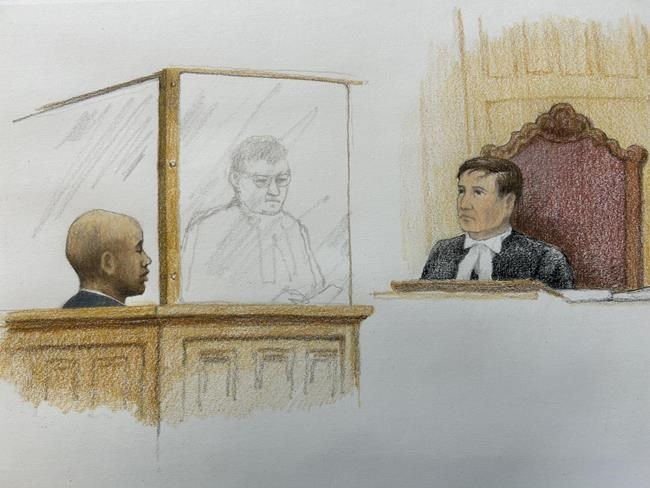NEW WESTMINSTER, B.C. — The man who committed a deadly mass stabbing at a library in North Vancouver, B.C., two years ago has apologized to each of his victims at his sentencing hearing, as he described the "story of self-destruction" that led up to the attack.
Yannick Bandaogo read his statement in French in a quiet, sometimes shaking voice, and said his addiction to crystal meth played a role in altering his mental health and behaviour.
But he offered no motive at the B.C. Supreme Court in New Westminster, B.C., nor did he directly refer to the series of stabbings outside the Lynn Valley Library on March 27, 2021, in which one woman died and six people were wounded.
Bandaogo, 30, pleaded guilty this year to second-degree murder, several charges of attempted murder and one count of aggravated assault over the attack.
"I must end my drug consumption in my daily life completely," Bandaogo told the court. "I want nothing but to show the sincerity of my regret through my future actions.
"It is difficult to find the words or sentences that can help me explain myself," he said. "I cannot but express my sincere condolences to all the people impacted, near and far, in this tragedy … and by my behaviour."
Bandaogo's lawyer said his client cannot explain why he launched the attack.
But Bandaogo told the court of a troubled childhood that led him into drug use.
He also apologized to his own family, saying he verbally and physically abused his parents and did not accept their attempts to help him as he spiralled into addiction.
Bandaogo said he left Quebec thinking he would leave his troubled past behind. But travelling to Vancouver via Toronto and Winnipeg gave him ample access to crystal meth, which he consumed in “enormous” amounts.
His drug habit, combined with his "loneliness and solitude" during the pandemic years, partly explained his behaviour, Bandaogo said.
Justice Geoffrey R.J. Gaul said he would deliver Bandaogo's sentence on Aug. 31.
Gaul said he needed to consider carefully the testimony of the victims, as well as consider the various mitigating and aggravating factors.
Crown and defence lawyers have jointly proposed that Bandaogo receive a sentence of life in prison with no chance of parole for 15 years, although Gaul may still decide differently.
Second-degree murder carries a mandatory life term, with a non-parole period of 10 to 25 years.
The court this week heard impact statements from victims and their relatives, including the mother of the woman who was killed, who said the death of her "gentle" and "fearless" daughter had shattered the family.
Neither the murdered woman nor her relatives can be named because of a publication ban.
Emma Henderson, who was stabbed in the face during the attack, said on Wednesday that she suffered a deviated septum among other severe injuries to her nose and mouth, and her constant pain and anxiety stemming from the incident still haunts her.
"I can't work," said Henderson, who was a university student at the time of the attack. "I couldn't do extracurriculars I was doing before. I couldn't finish school.
"I remember asking, 'What kind of monster would go around stabbing people in a library?' No one could give me an answer."
Another victim, Susanne Till, lost an eye in the attack and still suffers frequent headaches from the stabbing.
But Till told the court Wednesday what has been equally traumatizing has been the effect on her three children, one of whom was at the scene of the attack and rode in the ambulance with her to hospital while holding her blood-covered cellphone.
"I suffer from guilt and fear that I'm not protecting my children," Till said. "I worry about them. I feel that I failed to protect them … The fear, anger and depression are all consuming my daily life."
Before Bandaogo spoke on Friday, his mother, whose name was not released in court, said in a letter read out in French by a defence lawyer that her son had a long history of mental health and drug problems but was denied help.
She said Bandaogo was turned away when he showed up at hospitals in Quebec, and requests for help from other agencies were denied because he was not deemed “an immediate threat.”
Bandaogo’s condition worsened, her statement said, and he left Quebec without telling his family, who lost touch with him for about a year.
"This tragedy would not have happened if he received the help he needed," Bandaogo's mother's statement said. "I'm not justifying his actions, but to provide an explanation … addiction and mental health need to be addressed."
This report by The Canadian Press was first published July 7, 2023.
Chuck Chiang, The Canadian Press




